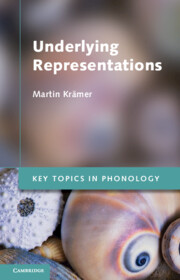Book contents
- Frontmatter
- Contents
- Acknowledgements
- Abbreviations
- 1 Getting started
- 2 Arbitrariness and opposition
- 3 Derivation and abstractness
- 4 Underspecification returns
- 5 The devil is in the detail
- 6 Psycho- and neurolinguistic evidence
- 7 On the form and contents of contrastive features
- 8 Underlying representations in Optimality Theory
- 9 Preliminary results
- Glossary
- Notes
- References
- Name index
- Language index
- Subject index
- References
8 - Underlying representations in Optimality Theory
Published online by Cambridge University Press: 05 November 2012
- Frontmatter
- Contents
- Acknowledgements
- Abbreviations
- 1 Getting started
- 2 Arbitrariness and opposition
- 3 Derivation and abstractness
- 4 Underspecification returns
- 5 The devil is in the detail
- 6 Psycho- and neurolinguistic evidence
- 7 On the form and contents of contrastive features
- 8 Underlying representations in Optimality Theory
- 9 Preliminary results
- Glossary
- Notes
- References
- Name index
- Language index
- Subject index
- References
Summary
Optimality Theory is a theory that is claimed to make predictions about the form of underlying representations. Thus, after we have seen neuro- and psycholinguistic evidence for some aspects of underlying forms, we might think we are now in a position to test whether the theory is appropriate in its predictions. However, we will also see that, since OT is a theory of computation rather than of representation and many aspects of the computation system (in particular the definition of constraints) depend on the feature theory used, there is not one set of predictions but several. After that, we make a U-turn and discuss the options for trimming the theory, such that it gives us some of the results that are confirmed by experimental or other evidence, and what insights we can gain from this exercise.
The first section of this chapter provides the basic architecture of OT. Readers familiar with the framework are warmly recommended to skip this section. The second section discusses OT’s mechanism of Lexicon Optimization and shows that this optimization is far from optimal when evaluated against the principles of lexical economy identified in previous chapters and against the neuro- and psycholinguistic evidence. In Section 8.3, we will consider some potential modifications to Lexicon Optimization and whether we can arrive at more appropriate results or have to abandon this way of generating underlying forms altogether.
- Type
- Chapter
- Information
- Underlying Representations , pp. 176 - 211Publisher: Cambridge University PressPrint publication year: 2012



